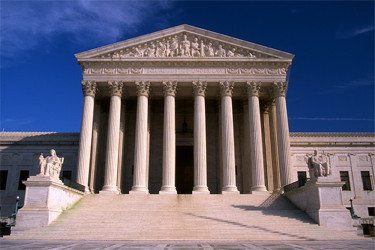Supreme Court Asked to Review NYC Law Regulating Crisis Pregnancy Centers
A conservative legal advocacy organization has asked the Roberts Court to review a federal appeals court decision reinstating portions of New York City's truth-in-advertising law regulating crisis pregnancy centers.

On Friday, the conservative American Center for Law and Justice asked the U.S. Supreme Court to review a federal appeals court decision that reinstated portions of a New York City law regulating so-called crisis pregnancy centers.
The law, first passed in 2011, places three specific disclosure requirements on crisis pregnancy centers: CPCs must disclose whether or not they have a licensed medical provider on staff who provides or directly supervises services at the CPC (a “Status Disclosure”); they must disclose that the New York City Department of Health encourages women who are or may be pregnant to consult with a licensed provider (the “Government Message”); and they must disclose to clients whether or not they provide referrals for abortions, emergency contraception, or prenatal care (the “Services Disclosure”). According to the law, these disclosures must be provided at entrances and waiting rooms, in any advertising done by the CPC, and during telephone conversations with potential clients. Failure to follow the disclosure requirements results in civil fines and the possibility of the facility closing for repeated violations.
Just shortly after New York City passed the law, conservative legal advocacy groups sued to block it on behalf of several religious nonprofits operating CPCs in the area, arguing it violated the First Amendment. In June 2011, a lower court preliminary enjoined the law, temporarily preventing it from taking effect. Attorneys for the city appealed, and in January 2014 a panel of judges on the U.S. Court of Appeals for the Second Circuit reversed a portion of that preliminary injunction and reinstated the “Status Disclosure” portion. However, the federal appeals court did not reinstate the “Services Disclosure” or “Government Message” portions of the law.
The petition filed by the legal advocacy group asks the Roberts Court to review the Second Circuit’s decision to reinstate the “Status Disclosure,” as well as the court’s conclusion that the law’s definition of what organizations constitute crisis pregnancy centers was not unconstitutionally vague.
There’s no guarantee the Supreme Court will grant review of the case. The Second Circuit’s ruling is consistent with other federal appeals courts that have looked at the issue, including the U.S. Court of Appeals for the Fourth Circuit. However, given the other First Amendment cases before the Supreme Court that involve a clash between reproductive rights and the First Amendment, such as the legal challenges to the contraception benefit in the Affordable Care Act and challenges to buffer zones around abortion clinics, conservatives on the Roberts Court have shown a willingness to entertain First Amendment claims by religious conservatives that seek to roll back women’s fundamental rights in the name of religious liberty and free speech.
“This is a critically important case that focuses on the constitutionally-protected rights of pro-life advocates,” said Jay Sekulow, chief counsel of the American Center for Law and Justice, in a statement. “To permit a law to remain in place that imposes burdensome requirements on crisis pregnancy centers is not only unacceptable but unconstitutional as well. We’re hopeful the high court will take the case and put an end to the efforts to silence pro-life pregnancy centers.”
It could be months before the Supreme Court announces whether or not it will review the case.

